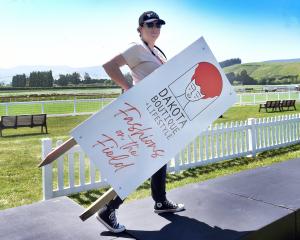
Ahead of the arrival of 45 Syrian refugees to Dunedin, reporter Vaughan Elder and videographer Craig Baxter visited the Mangere Refugee Resettlement Centre in Auckland to hear some of their stories.
After four years of dealing with death and destruction and being treated as less than human, Mohammad Zetwn and his family finally have hope for the future.
Mr Zetwn (33), wife Walaa (25), daughter Amira (4) and son Abdulaziz (3) will be among the first group of 45 Syrian refugees to arrive in Dunedin from April 22.
The Zetwns' story of escaping their home town, which was slowly being destroyed by war, and making it to Lebanon, where they were treated as second-class citizens, is similar to those of many Dunedin-bound Syrians.
Some of the other refugees at the Mangere Refugee Resettlement Centre have lost family members, one child has a piece of shrapnel lodged in his liver and others have had their homes destroyed.
But, after a month at the centre, Mr Zetwn, along with the other refugees, feels safe and has hope for the first time in ages.
"We were so happy to learn that the people of Dunedin are happy that we are coming ... and they are preparing all sorts of things to welcome us.
"It's just making us so, so happy, and it's making us forget all the suffering that we have faced before,'' Mr Zetwn said through an interpreter.
Before Mr Zetwn and his family escaped their home town of Al-Zabadani, near the border of Lebanon, on August 25, 2012, they were dealing with bombings almost every day.
The city, which is close to Syria's capital, Damascus, was the first to come under control of the Free Syrian Army in January 2012 and has been the centre of intense fighting between rebels and forces loyal to President Bashar al-Assad's Government since.
"Our city is surrounded by military points and bases, so they were firing at us, plus the bombing. It was just a slow destruction of the whole city, from every angle possible.
"It wasn't just me [affected], it was everyone - kids were being killed, women were being killed, innocent people, because we were there right in the middle of all the fighting.''
Since they left, the situation had become worse in the city, which has changed hands between Government and rebel control multiple times.
It had been under siege by the Assad regime and Hezbollah forces since July last year.
Humanitarian organisation Medecins Sans Frontieres yesterday reported a "catalogue of horror'' in besieged areas included the last doctor left in Al-Zabadani being shot dead by a sniper after treating a patient.
Mr Zetwn said most of his friends and family had left.
The few who remained were trapped in the city.
Things did not get much better after the family crossed the border into Lebanon, where they lived in the Baalbeck area.
"The area that we lived in was really bad; the presence of the Government, or the authorities, was very weak.''
Not being able to get refugee status was compounded by the "humiliation'' they suffered from the Lebanese people.
"They exploited us in the workplace because there was not much work opportunities; they actually basically used us.
"We would be beaten or humiliated and we couldn't say anything. We couldn't defend ourselves, because of our legal status.
"Just simply the way they looked at us; they looked down on us and it just caused us so much pain.''
Some people in Lebanon did take care of them, but they were in the minority.
He did not know what to think at first after learning in September last year his family could move to New Zealand, as he knew nothing about the country.
"But, because of the situation we were living in, in Lebanon, I was ready to say ‘yes' to anything and accept any offer to leave.''
His thoughts changed once he began researching life in New Zealand.
"In the beginning, it was just somewhere to escape from the situation we were in in Lebanon, but then gradually, as I learned more about New Zealand, it became a dream.
"I was just blown away.''
Since arriving last month in Mangere - where refugees are taught English and about life in New Zealand - this view had got even stronger.
"The humanity that we are seeing here, the kindness we are receiving from all the staff we are in direct contact with here, is just making us feel so safe, so secure. We feel at peace, we feel that finally we are safe and we are very happy.''
He had learned a little bit about Dunedin while in Mangere and was excited about it becoming his "second home''.
"I know it's very cold and that's very similar to my home city.
"I've learnt it's a beautiful city, the nature of the city is so beautiful, and it's exactly what I want.
"It's the picture that I have in my head for where I want to be.''His hopes for life in Dunedin centred on studying and then finding a job.
He wanted to thank New Zealand for giving his family a future to look forward to.
"I would like to extend my gratitude, my people's gratitude, all the Arabs who are here; we want to thank New Zealand for what you've done for us.
"No matter how many thank-yous we say, it's not going to be enough for what you have done for us.''












